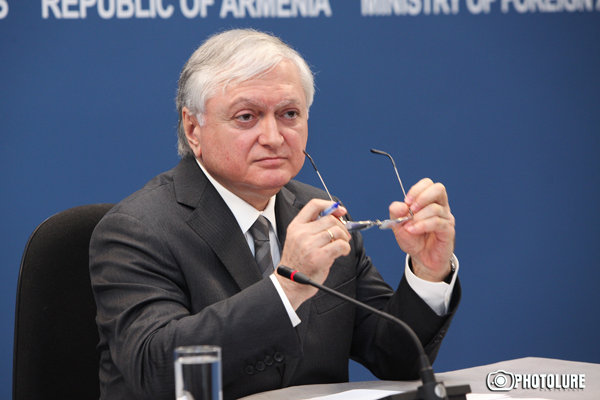Statement by Foreign Minister Edward Nalbandian at the OSCE Informal Ministerial Meeting in Potsdam
I would like to thank Minister Steinmeier for this important initiative to exchange views in preparation for the OSCE Ministerial Council in coming December, to deploy efforts to make Hamburg meeting joint success.
Indeed, success is not merely measured by the number of adopted decisions, but the quality of our dialogue.
It is evident that any challenge in the OSCE area needs to be dealt through dialogue. We can debate endlessly the essence and scope of the OSCE principles and commitments, which should shape this dialogue. However, if we do not agree on one basic principle then apparently all our efforts will be in vain. The non-use of force or threat of use force constitutes that very principle. Unconditional adherence to non-use of force is essential for any security related endeavor in the OSCE area.
Read also
The April preplanned large-scale military offensive of Azerbaijan against Nagorno-Karabakh, accompanied by atrocities and gross violations of the international humanitarian law was not merely another escalation of this conflict. It was a challenge to common security and stability of the OSCE area. It seriously threw back the process of Nagorno-Karabakh conflict resolution.
Such attempts of using force as an instrument of pressure on the negotiating process, if not adequately addressed, may pave the way for serious destabilization with unpredictable consequences for entire region. To restore the trust in the process of the conflict resolution, measures should be taken to prevent use of force and create conditions conducive for the advancement of the peace process.
This was the main aim of the two Summits on Nagorno-Karabakh held in Vienna in May and in St. Petersburg in June. First of all, it is a necessity to implement what was particularly emphasized and agreed upon in the framework of these Summits – the full adherence to the 1994-1995 trilateral ceasefire agreements, which do not have time limitations, the creation of mechanism for investigation of ceasefire violations, the expansion of the capacity of the Personal Representative of the OSCE Chairperson-in-Office.
Conflicts in the OSCE area are not identical when it comes to principles upon which they should be resolved. Each and every conflict has its own features and should be approached based on its specificities. There is one common principle that should be pushed in all conflict situations and that is non-use of force.
«Either our way or the war» approach is a dead-end. This type of language was used in the OSCE by Azerbaijani diplomats who, ignoring the approaches expressed in five statements of the presidents of the Co-Chair countries on the Nagorno-Karabakh conflict resolution, are trying to present their own perceptions or interpretations as the only peaceful way of the settlement. When even diplomats talk in such a language then the problem goes far beyond a mere lack of a good will.
The rights of people residing in the conflict areas need to be put in the heart of both crisis management and conflict resolution. The recognition and the realization of the right to self-determination of the people of Nagorno-Karabakh is essential in any substantive progress within this conflict settlement.
Dear Colleagues,
Effective arms control regime and its full implementation are crucial in ensuring practical application of the principle of non-use of force or threat of force.
We read with great interest the August 26 article of the Chairman-in-office containing a proposal to re-launch the arms control. Armenia has always been supporter of improved cooperative security arrangements aimed at enhanced transparency and predictability in the OSCE area based on the principles of restraint and risk reduction. It is in this vein that Armenia is going to engage in the discussions regarding the future of arms control in Europe. The uncontrolled and skyrocketing accumulation of offensive weaponry should be prevented.
We appreciate efforts aimed at updating the Vienna Document. But, we need also to employ more efforts to ensure the implementation of the current Vienna Document and OSCE commitments related to the arms control. We saw repetitive violations of essential provisions of the Document including those related to notification of military exercises and verification.
Dear Colleagues,
We have consistently highlighted protection of rights of people living in the conflict areas, enhancing OSCE capacities first and foremost in the conflict related field missions, strengthening confidence building measures in all three dimensions. Full implementation of commitments related to conflict cycle particularly the Vilnius decision should come first in this regard.
In conclusion I would like to stress that Armenia will continue its support to the German Chairmanship in preparation of the Hamburg Ministerial Council.
Thank you.
Ministry of Foreign Affairs






















































